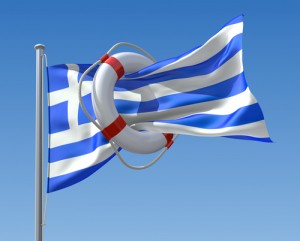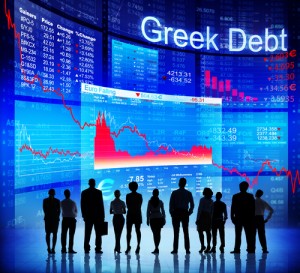By Jonathan Chevreau,
Financial Independence Hub
Thus far, the Hub has not commented directly on the ongoing crisis in Greece. Since we’re in something of a pause mode until the Referendum on Sunday, it seems as good a time as any to venture into this issue.
I am as transfixed as anyone by the images of Greek pensioners lining up almost daily for their 60-euro ATM infusions. Those who follow my Twitter feed — which also runs to the right of the Hub’s home page — will know that probably every second tweet or retweet concerns Greece in some way.
The world’s major newspapers and broadcast media seem to me to be doing a more than adequate job in reporting on this crisis. For instance, in Thursday’s Financial Post, Gluskin Sheff’s David Rosenberg wrote a useful piece about Why he still isn’t worried about Grexit. And the cover story in this week’s just-published The Economist nicely lays out the possible near future in Europe’s Future Lies in Greece’s Hands.
There’s little point in adding to the discussion if I can’t provide some unique perspectives. I’m no expert on Greece so I cannot: I’ve never even visited the country, although last fall we were right next door in neighbouring Turkey.
I can say that I’ve not made any changes in our family’s investments in response to this ongoing drama. I briefly owned a tiny position in a Greece ETF in 2014, thinking the worst was over but jettisoned it for tax-loss selling purposes late in 2014 and it will be a long time before I’m tempted to re-enter that position. If ever.
Cash is the furthest thing from Trash right now
Certainly, the daily TV coverage of ATM withdrawals does underline the value of cold hard cash. If ever there were a case study proving that cash can be king and not trash, it is in modern Greece. We sometimes forget that the ultimate purpose of long-term investments in stocks and “risk” securities is to convert some of them to cash (or collect dividends) to meet the daily needs of living.
Thursday’s Hub guest blog by Boomer & Echo’s Robb Engen is also instructive in this context. In Why Millennials should use multiple streams of income as their emergency fund, Robb explained a concept that could apply as much to any other generation, including those in Greece. Clearly, the situation in Greece right now constitutes an emergency and it seems to me that all those seniors in the ATM lineups are overly dependent on a single stream of income: government pensions. The panic on their faces is evidence of the anguish they feel at having that single source of income dry up entirely, which could easily happen if Greece runs out of Euros and is ultimately forced to start printing its own drachmas. I imagine that would take weeks or months and once they did, inflation would soon start with a vengeance.
The Hub has never counselled that people rely on a single source of income, apart from employment income, which is a necessary evil until one has established a modicum of financial independence. Even then, if you’re part of a couple, two sets of employer incomes are preferable. As I write in the book Findependence Day, then if one engine conks out, the second engine can take the airplane to safety.
 Multiple streams of income provide a true safety net
Multiple streams of income provide a true safety net
Similarly, the Greek drama illustrates the hazards of relying exclusively on Government pensions. I wouldn’t suggest that American seniors count only on Social Security, or that Canadian seniors do the same with the trio of Canada Pension Plan, Old Age Security and (in some cases) the Guaranteed Income Supplement. A proper retirement should at a minimum rest on a three-legged stool whose legs consist of Government pensions, employer pensions and personal savings. Other sources would be a bonus, including business income or income from part-time work.
Now is not the time for major changes in Asset Allocation
Generally speaking it’s a mistake to undertake major shifts in investment strategy once a crisis has already hit. Did I ever think we’d see Greek pensioners lining up at ATMs? No. But once we did, in my view it was too late to dial down investment risk. Those who panicked on Monday’s sell-off were no doubt buying back in later in the week when it became more clear that while it may be the end of the Greek world as we know it, it’s unlikely to be the end of Europe or the rest of the planet. Mind you, those who are way overweight risk assets could take the opportunity to lighten up a tad if markets remain sanguine until their close Friday afternoon, just in case Sunday’s referendum plunges us into a true Black Monday when markets reopen early next week.
Certainly, if you’re paying a financial advisor to monitor your investments, now would be a good time to meet or at least solicit their opinion over the phone or by email. I would think many of the better ones would already have initiated this process with a bulletin or email advisory, perhaps along the lines of this blog.
If you don’t have a professional to bounce ideas and concerns off, you can find lists of US and Canadian fee-for-service planners, and other professionals we think “get” Findependence, under the Hub’s Guidance tab here.



I’ve been talking to my kids about ways to become self-sufficient and self employment and multiple streams seem the way to go. At the end of the day the best bet you can make is on yourself. As for me in these times of uncertainty I have my father in law teaching me how to start a vegetable garden. Next lesson how to catch fish!